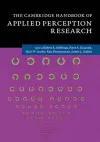
The Cambridge Handbook of Applied Perception Research 2 Volume Hardback Set
5 contributors - Set / collection
£331.00
Robert R. Hoffman, Ph.D. specializes in cognitive systems engineering and human-centered computing. He is a Fellow of the Association for Psychological Science, a Fellow of the Human Factors and Ergonomics Society, and a Fulbright Scholar. Hoffman has been recognized internationally for his research and work on human factors in remote sensing, on the psychology of expertise and the methodology of cognitive task analysis, and on human-centered computing issues and intelligent systems technology, as well as the design of macrocognitive work systems. Hoffman is a co-editor for the Department on Human-Centered Computing in IEEE: Intelligent Systems, editor for the book series Expertise: Research and Applications, and co-founder of the Journal of Cognitive Engineering and Decision Making. His current research focuses on the psychology of intelligence analysis, methodological issues in the analysis of complex systems, and performance measurement for macrocognitive work systems. A full vita and all of his publications are available at www.ihmc.us/users/rhoffman/main. Peter A. Hancock, D.Sc., Ph.D. is Provost Distinguished Research Professor, Pegasus Professor, and Trustee Chair in the Department of Psychology and the Institute for Simulation and Training, as well as in the Department of Civil and Environmental Engineering and the Department of Industrial Engineering and Management Systems at the University of Central Florida. He also directs the MIT2 (Minds in Technology, Machines in Thought) Research Laboratories. He is the author of more than 700 refereed scientific articles and publications and author or editor of fifteen books, including Human Performance and Ergonomics (1999), Stress, Workload, and Fatigue (2001), and Performance under Stress (2008). He is a Fellow of numerous scientific societies and was the president of the Human Factors and Ergonomics Society in 2000. His work revolves primarily around the reciprocal influence between human beings and technology. He also works on the theoretical and empirical exploration of time and is an award-winning historian. Details of his work can be found at www.peterhancock.ucf.edu. Mark W. Scerbo, Ph.D. is Professor of human factors psychology at Old Dominion University, Virginia. He began his career as a research assistant at AT&T Bell Laboratories in 1980, received his Ph.D. in experimental psychology from the University of Cincinnati in 1987, and then returned to AT&T where he managed the Systems Evaluation Center in New Jersey from 1987 to 1990, introducing usability engineering to the Network Operations Division. He is a Fellow of the Human Factors and Ergonomics Society and received his Modeling and Simulation Professional Certification in 2002. He has more than 160 scientific publications and currently serves as an associate editor for the journals Simulation in Healthcare and Human Factors. He has more than thirty years of experience researching and designing systems and displays that improve user performance in academic, military, and industrial work environments. His current research interests are focused on user interaction with medical simulation technology. In addition, he has studied human factors issues related to the behavioral and physiological factors that affect human interaction with virtual environments, automated systems, and adaptive interfaces. Raja Parasuraman, Ph.D. is University Professor of Psychology at George Mason University, Virginia. He is also director of the Graduate Program in Human Factors and Applied Cognition and of the Center of Excellence in Neuroergonomics, Technology, and Cognition. His primary research is in human factors and cognitive neuroscience, as well as in molecular genetics of cognition and in neuroergonomics, which he defines as the study of brain and behavior at work. His books include The Attentive Brain (1998), Neuroergonomics: The Brain at Work (2007), and Nurturing the Older Brain and Mind (2012). Parasuraman is Fellow of numerous organizations, including the American Psychological Association (1991) and the International Ergonomics Association (2006), and is a National Associate of the National Academy of Sciences. He is the recipient of numerous awards and honors, including the Jerome H. Ely Award for best paper in the journal Human Factors (1997, 2001), the Franklin V. Taylor Award for Lifetime Achievement in Applied Experimental and Engineering Psychology from the American Psychological Association (2004), the inaugural Raymond S. Nickerson Award for Best Paper in the Journal of Experimental Psychology: Applied (2010), and the Admiral Kollmorgen Spirit of Innovation Award for Contributions to Neuroergonomics (2010). His recent awards include the Triennial Outstanding Educators Award from the International Ergonomics Association and the Celebration of Scholarship Award from the College of Humanities and Social Sciences at George Mason University (both in 2012). James L. Szalma, Ph.D. is an Associate Professor in the Psychology Department at the University of Central Florida. He received a B.S. in chemistry from the University of Michigan, and an M.A. and Ph.D. in applied experimental/human factors psychology from the University of Cincinnati. His Human Performance Research Laboratory studies how variations in task characteristics interact with the characteristics of the person (i.e. cognitive abilities, personality, emotion, motivation) to influence performance, workload, and stress of cognitively demanding tasks. His primary research interests include signal/threat detection (e.g. friend/foe identification), training for threat detection, and how the characteristics of tasks and operators interact to influence performance in the context of tasks that require sustained attention or that include human-automation interaction. He is currently conducting research on the application of video game-based tasks to train sustained attention, and on the validity of Fuzzy Signal Detection Theory for performance evaluation in threat detection.